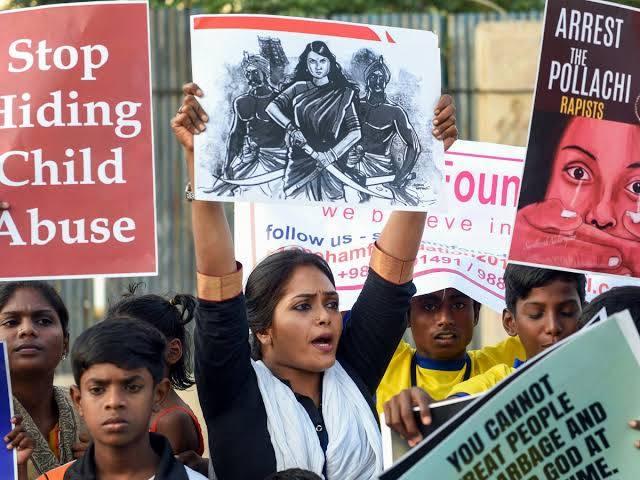Table of Contents
Overview
A recent judgment pronounced by the Supreme Court on November 7, 2019 in the case of “Manoharan V. State by Inspector of Police” needed a good attention as the Supreme Court has dismissed the “Review Petition” filed by Manoharan i.e. Appellant-Accused whose death penalty was upheld by few months back on the ground that “dissent of one judge does not put a bar for upholding the penalty.” It has to be noted here that the Supreme Court (2:1) in August 2019 held the accused guilty for involving in gang rape for the 10 year old child girl and then murdering her and her brother as well and thus convicted him for the death penalty. One thing which must be acknowledged that “Justice Rohinton Fali Nariman” and “Justice Surya Kant” had upheld the death penalty in favor of accused and “Justice Sanjiv Khanna” had the different opinion and he was against upholding the death penalty that was awarded to Manoharan.
Relevant Facts
Procedural History
“The Trial Court ultimately held the Manoharan guilty under section 120-B, 364-A 376, 302 324 r/w 34 and 201 IPC and then the he was convicted for the death sentence”.
“The Madras High Court also confirmed the death sentence awarded by the Trial Court”
Afterwards a “Special Leave Petition” was also filed under “Article 136” but again the appeal was dismissed and the death sentence was confirmed by the majority.
After all this, Present petition for Review of the High Court Judgment was filed because Justice Khanna has “dissented his opinion on the quantum of sentence.”
Relevant Laws
A. According to the judgement given in the “Machhi Singh v. State of Punjab” case, the sentence may be given by the court in the following cases:-
After looking at the facts, circumstances and the nature of the crime committed, if the court is of the opinion that life imprisonment comes out to be inadequate punishment, only then the court may award for the death sentence.
B. “Protection of children from Sexual Offences (Amendment) Bill”, 2019 have been passed by the Parliament of India on 1 August 2019 here the Supreme Court stated that the “minimum punishment for commission of such and penetrative sexual assault has been increased to imprisonment of 20 year which is also extendable to the life imprisonment or death.”
Issues
Arguments
High court is of the “opinion that the facts and circumstances of the case are of such a nature that the death penalty has to be provided.”
The offence of raping of a minor girl and later the murder of the two children and the “element of violence can’t be ignored” the attempt of using poison mixed in the cow dung and milk was also made by the accused so that he can run away from the crime he has committed but very fortunately the children didn’t die due to that attempt however the accused drove the children in the canal and fled away, the body was also recovered couples of kilometer away from the canal.
Here the accused “entertained him with and intentionally arranged wrongdoing” and he very accurately executed it, thus, the “capital punishment” might be the proper discipline for such an unpleasant offence.
The appellant had “retraced the last part of his confession” as to his involvement in the sexual assault rape and throwing and is drowning the children in the canal but, however, he accept the first portion of the confession made by him and he confessed that he was there in the van but states that “he had not raped the girl and remained standing.”
Legal Background and Interpretation of Law
At the time of proceeding in Trial Court the prosecution examined 49 witnesses, including all those people who witnessed abduction, purchase of milk, buying of poisonous substance and cow dung and all people who have seen the children in the custody of the accused person is at the various places.
The “last seen theory” was also built by the prosecution, “confessional statement was also made by the petitioner under sec 164 of CrPC.”
The Madras High Court set aside the conviction under section 120B and 364A IPC as convicted by the trial court in under these sections as well of IPC but confirm the sentences under section 307, 308 r/w 34 and 201 IPC.
Ratio
The appellant’s conviction was upheld by the court by (2 judges).The court states that this case falls under the category of “rarest of rare and there is no alternative to death penalty.” J. Khanna was of the different opinion and according to him the test sentence should not be given on the account of the “test of mitigating and aggravating circumstances laid down in the Bachan Singh case.”
Ruling of the Case
The “review petitions was dismissed” as the Appellant Accused along with the deceased person has committed a “sexual assault on the 10 year old girl and cold blooded murder of both the minor children in the most heinous manner” possible and hence there is no good ground for reviewing the petition.
Author: Umang Bhatla,
Delhi Metropolitan Education affiliated to GGSIPU, 3rd Yr.

